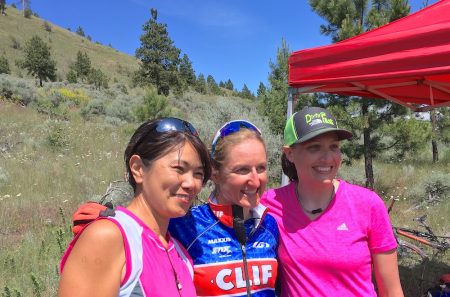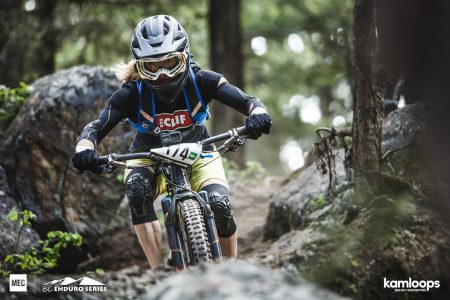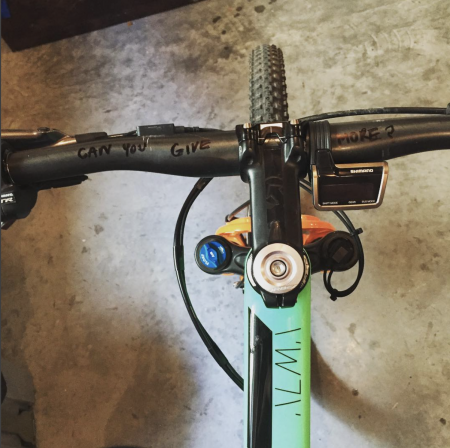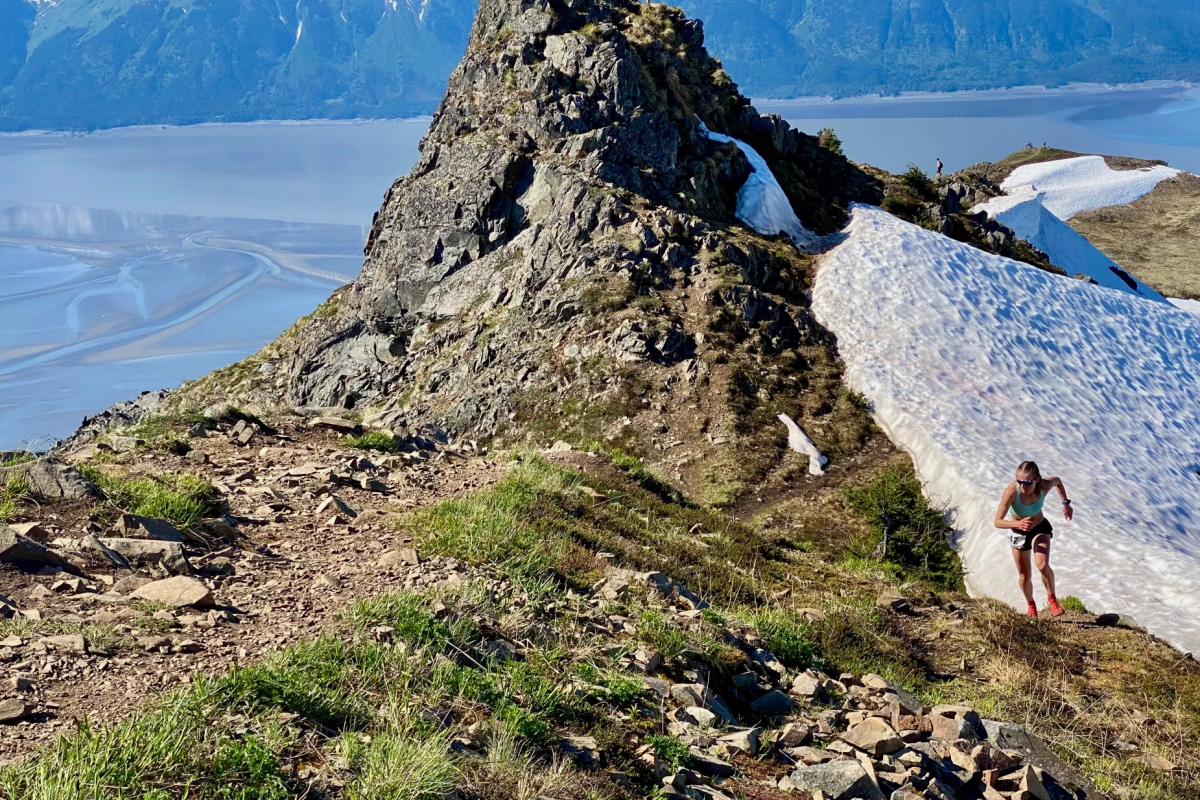
“I’m Catharine Pendrel and I’m a cross-country mountain biker.”
Fans of mountain biking need no introduction to the Olympic medallist, world champion and three-time World Cup overall winner from Canada. Pendrel, 36, is also a masters world champion in skiing after winning her age group in the 15-kilometer freestyle in 2011 at Sovereign Lake in Vernon, British Columbia.
FasterSkier caught up with Pendrel, a New Brunswick native, at a six-hour biking event this past Sunday, June 11, in her adopted hometown of Kamloops, B.C. With two World Cup events completed, she was training at home before her next competition block.

“Today, I’m at a six-hour enduro race,” she explained. “I’ve got a partner, we’re trading off every two laps and trying to get as many laps in as we can in six hours.”
Pendrel spent her downtime refueling, chatting with fans and posing for photographs. She started the last 14 k lap in second place, 9 seconds behind her husband’s team and determined to win bragging rights at the post-race party. She returned twenty minutes later, laughing about a flat tire that cost her team the chance at the overall win. Pendrel was out to have fun and the sudden end to the race didn’t change that. That could be what keeps the three-time Olympian going.
“When I moved to British Columbia, I had to find a way to train in the winter,” she said. “I learned how to cross-country ski, and I love it. You’re getting out there, seeing the sun on the snow and just really enjoying it. It’s a nice break from just riding your bike all year.”
Kamloops winters, like the neighbouring Okanagan Valley, feature long periods of low clouds and dry roads. Ski trails are mostly above 1000 meters and above the clouds.
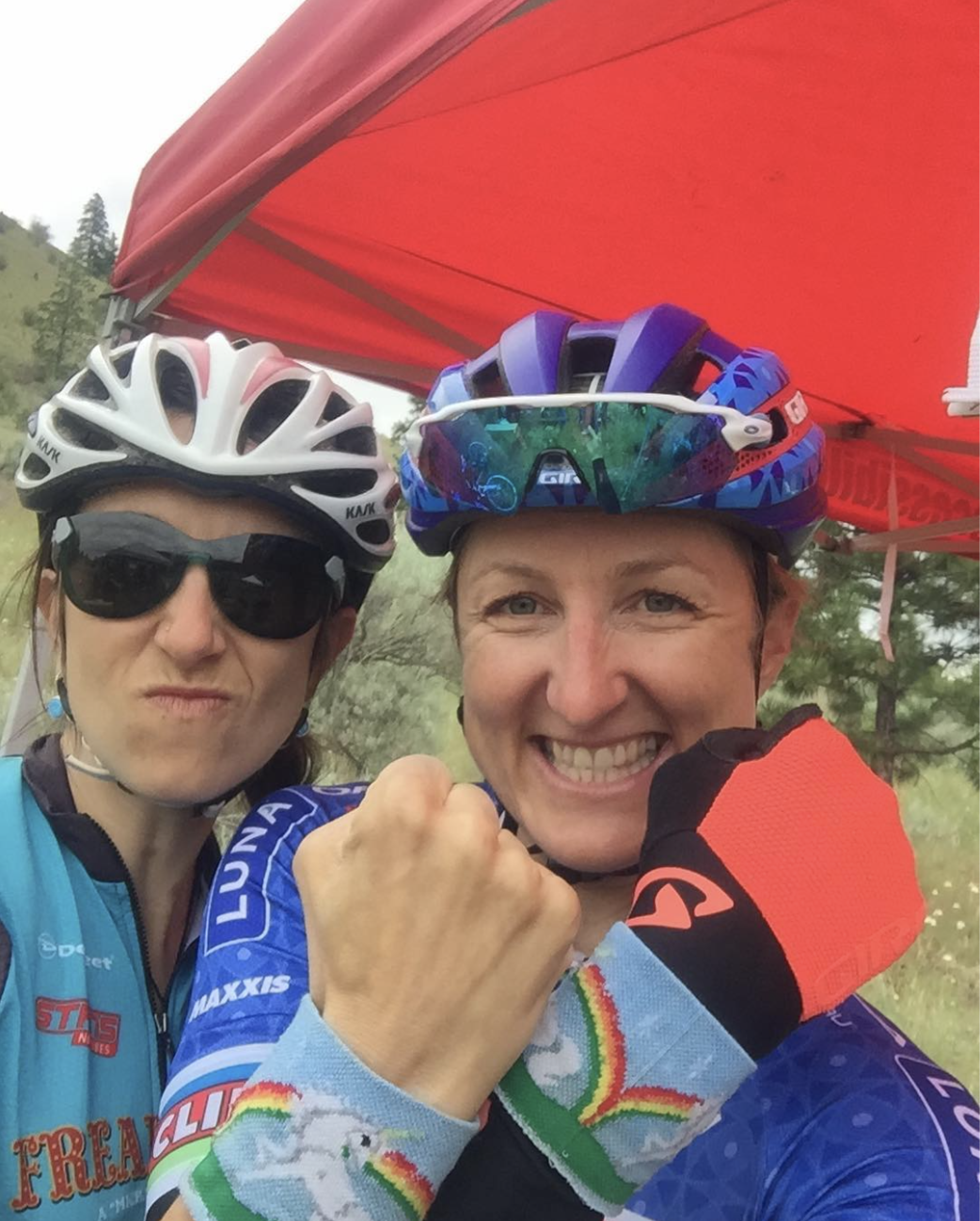
“I turned 30 and masters world champs were down the road from us in Vernon, so I was like, ‘May as well give this a go,’ and those went well,” she said with a laugh. “So I’ve got a world title in master cross-country skiing to my name. Usually I just hop in a couple of loppets if I can fit them into my season.”
What’s her favourite workout?
“Different ones for different objectives, but I have one recently that I’ve been doing,” Pendrel responded. “I’ll do hill descents, and I’ll try to take a second off my time every time down, and just muscular endurance on the climb back up. Two birds with one stone.”
One thing that cross-country skiing and cross-country mountain biking share is that in a mass start, the win goes to the first person across the finish line. Time gained on descents is just as valuable and usually costs less. In skiing, this saving can be larger as snowplowing or skidding through corners uses a lot more energy than step turns.
Pendrel’s in-season workout suits her sport and elite abilities, but it can be scaled back and tailored to individual needs. The full three-hour workout she did last week went like this, with skiing translations in parentheses.
(Note: She prefers to stay away from concrete numbers when it comes to sets and duration of working vs. recovery periods — “always mixing up duration and intensity to keep all the tops spinning as my coach Dan Proulx would say”, but she provided the following example. She also estimated that about 80 percent of the workout is aerobic, a.k.a. Zone or Level 1).
The Workout:
- Aerobic warmup: (Zone 1-2 for skiers):
- 5 x 1-minute of high cadence, 1-min. easy
- 3 x 20-second max-start practice, 2-min. recovery
- Maximum aerobic power (MAP) intervals on flat or uphill terrain:
- Two to four sets of 2.5 to 5 minutes “as hard as you can go,” usually with one to one recovery. Sometimes Pendrel takes more recovery closer to a big race. “I prefer doing intervals as best effort rather than riding to a number. That’s what guides you in a race.”
- Aerobic recovery
- 3 x 12-minute tempo-to-threshold, 5-min. recovery:
- (One- to two-hour race pace, Zone 3, for short periods)
- Note: her tempo and threshold work is usually 3-4 sets of 10-20 min, with 3:1 recovery or less.
- Aerobic recovery
- Hill-descent repeats:
- 1 second faster each lap. The climb back to the top is “muscular endurance” working on force and smooth pedaling under load (which doesn’t translate well to skiing terminology, but isn’t demanding in cardio terms. See this explanation).
- Aerobic recovery
There are lots of lessons for skiers here:
- First, Pendrel is not obsessed with specific times or numbers, instead focussing on achieving training goals. The only number she remembered less than a week later was the approximate total time. Times and data are recorded to measure that 1-second improvement.
- One-second faster is an incremental goal: many small steps forward instead of one big leap.
- Descending gains are as much mental as physical. Finding a faster line through a corner or making better use of a rut or berm cuts time without increasing energy output.
- There are different kinds of intensity in the same workout.
- Pendrel is not just working on making her strengths stronger. This single workout provides gains in three separate performance areas.
- Finally, the descending session is in the final hour, which means she is practising the technical skills with tired legs. Three birds with one stone.
Pendrel’s final words of advice: “If you’re a skier, you should mountain bike in the summer ‘cause it’s awesome.”
